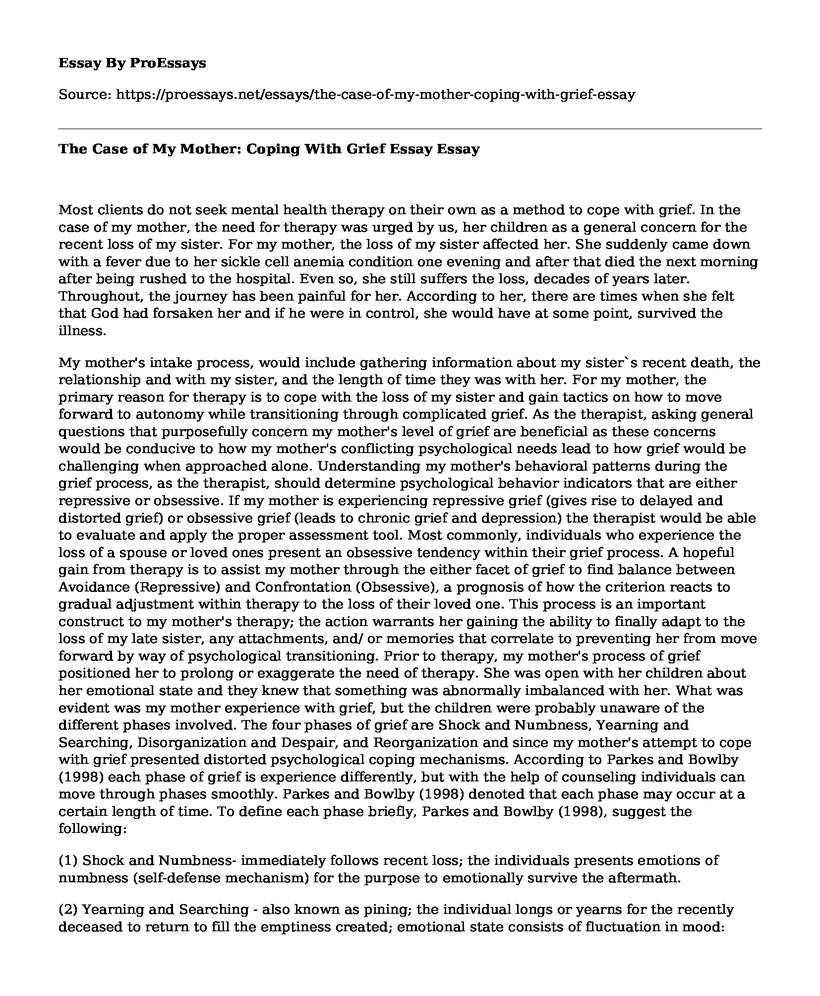Most clients do not seek mental health therapy on their own as a method to cope with grief. In the case of my mother, the need for therapy was urged by us, her children as a general concern for the recent loss of my sister. For my mother, the loss of my sister affected her. She suddenly came down with a fever due to her sickle cell anemia condition one evening and after that died the next morning after being rushed to the hospital. Even so, she still suffers the loss, decades of years later. Throughout, the journey has been painful for her. According to her, there are times when she felt that God had forsaken her and if he were in control, she would have at some point, survived the illness.
My mother's intake process, would include gathering information about my sister`s recent death, the relationship and with my sister, and the length of time they was with her. For my mother, the primary reason for therapy is to cope with the loss of my sister and gain tactics on how to move forward to autonomy while transitioning through complicated grief. As the therapist, asking general questions that purposefully concern my mother's level of grief are beneficial as these concerns would be conducive to how my mother's conflicting psychological needs lead to how grief would be challenging when approached alone. Understanding my mother's behavioral patterns during the grief process, as the therapist, should determine psychological behavior indicators that are either repressive or obsessive. If my mother is experiencing repressive grief (gives rise to delayed and distorted grief) or obsessive grief (leads to chronic grief and depression) the therapist would be able to evaluate and apply the proper assessment tool. Most commonly, individuals who experience the loss of a spouse or loved ones present an obsessive tendency within their grief process. A hopeful gain from therapy is to assist my mother through the either facet of grief to find balance between Avoidance (Repressive) and Confrontation (Obsessive), a prognosis of how the criterion reacts to gradual adjustment within therapy to the loss of their loved one. This process is an important construct to my mother's therapy; the action warrants her gaining the ability to finally adapt to the loss of my late sister, any attachments, and/ or memories that correlate to preventing her from move forward by way of psychological transitioning. Prior to therapy, my mother's process of grief positioned her to prolong or exaggerate the need of therapy. She was open with her children about her emotional state and they knew that something was abnormally imbalanced with her. What was evident was my mother experience with grief, but the children were probably unaware of the different phases involved. The four phases of grief are Shock and Numbness, Yearning and Searching, Disorganization and Despair, and Reorganization and since my mother's attempt to cope with grief presented distorted psychological coping mechanisms. According to Parkes and Bowlby (1998) each phase of grief is experience differently, but with the help of counseling individuals can move through phases smoothly. Parkes and Bowlby (1998) denoted that each phase may occur at a certain length of time. To define each phase briefly, Parkes and Bowlby (1998), suggest the following:
(1) Shock and Numbness- immediately follows recent loss; the individuals presents emotions of numbness (self-defense mechanism) for the purpose to emotionally survive the aftermath.
(2) Yearning and Searching - also known as pining; the individual longs or yearns for the recently deceased to return to fill the emptiness created; emotional state consists of fluctuation in mood: crying, anger, anxiety, preoccupation, and confusion.
(3) Disorganization and Despair- the individuals have strong desires to isolate from family and activities that were once considered amusement; begin to accept the loss a reality and previous phase is not intense while feelings of apathy, anger, despair, hopelessness and questioning are presented.
(4) Reorganization and Recovery- individuals begins to return to a new normal, weight gain, and interest in amusement returns; the constant thoughts of sadness and despair dwindle while the positive memories of the deceased begin. According to the scenario, my mother's emotional state indicates the lack of sleep, crying, and lack of energy to relocate, are signs that was in phase of yearning and searching. Another facet to consider is my mother's stance on grieving and whether it is or is not permissible. With this in mind is there a certain perception of Complicated Grief Therapy (CGT), as it clearly relates, to the way she has processed the death of my sister. After clearly hearing his position, as the therapist, understanding my mother's reason to wait a year until he committed to Mental Health therapy to cope with grief.
Cite this page
The Case of My Mother: Coping With Grief Essay. (2022, May 09). Retrieved from https://proessays.net/essays/the-case-of-my-mother-coping-with-grief-essay
If you are the original author of this essay and no longer wish to have it published on the ProEssays website, please click below to request its removal:
- Thoughts About "Take Your Pills" Documentary Essay
- Paper Example on College Students: Unequal Impact of Issues
- Essay Example on Family Connections Theory: Interdependence and Emotional Strength
- Creating a Sensory-Friendly Environment for Children With Autism in Primary Care - Essay Sample
- Research Paper on Autism: A Complex Developmental Disorder
- Exploring Autism Spectrum Disorder and Its Impact on Society - Research Paper
- Essay Sample: Employee Well-Being and Knowledge Sharing in Saudi Aramco







